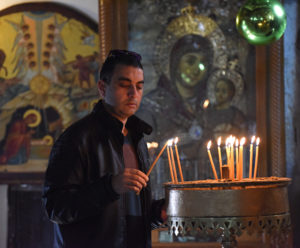SILVER SPRING, Md. — The dwindling presence of Christians in the Middle East amounts to “memoricide,” according to Elizabeth Prodromou, a senior fellow in national security and international policy at the Center for American Progress.

Sezer Abu Shkara, An Arab Catholic from Haifa, Israel, lights a candle in the Church of Nativity, where tradition holds Christ was born in Bethlehem, West Bank. Few tourists are visiting Bethlehem this Christmas season because of the recent violence between Israelis and Palestinians. (CNS photo/Debbie Hill)
The difference, Prodromou said at a Sept. 23 forum on the topic, is between “survive and thrive” and Middle East Christians “being erased from their homelands, probably in all of our lifetimes.”
Prodromou made her remarks at a Knights of Columbus-sponsored presentation during the Religion Newswriters Association’s meeting in the Washington suburb of Silver Spring.
The West’s response to the Islamic State’s cleansing of Christians from the region over the past two years, on top of more than a decade of war and civil war in Iraq and neighboring Syria, depends in large part on “how you ask the question,” Prodromou said.
The State Department this past spring called Islamic State’s actions against Christians and other groups a genocide.
“The condition of Christians is a bellwether to the safety and security of other marginalized groups,” including the Yezidis, she said, but it does not mean that helping one group means that other religious minorities in the Middle East should be ignored.
The phenomenon had spread to Egypt, where “a clear pattern is at work,” Prodromou said, “to set up Christians as separate and unequal before the state,” with a “Christian designation” on Egyptian identification cards.
“Whether we’re talking about a slow bleed or an emergency situation,” she added, it is clear that “a systematic elimination of a footprint” is at work in the region, a “‘memoricide’ that makes it easier for people to forget.”
Prodromou hailed the “progressive-conservative conversation” on the plight of the region’s Christians, a point echoed by Nina Shea, a senior fellow and director of the Hudson Institute’s Center for Religious Freedom. “We have a left-right coalition, which we cannot take for granted in an election year,” Shea said.
Shea focused her remarks on the situation facing Syria’s Christian refugees. Of those chosen to be resettled into the United States, she said, they constitute one-half of 1 percent of the 10,000 having arrived in the United States. “That number comes to 66 Christians – roughly 11 families,” she said.
The U.N. High Commissioner for Refugees is “not up to the task,” Shea charged. While Syrian Christians would prefer to stay in their homeland, they are asserting a legitimate right to flee the multisided violence in their country, she said.
But the U.N., Shea alleged, has blocked Syrian Christians’ pleas for resettlement, or even to stay in U.N. camps under the guise that the region should not be depopulated of its Christians.
Shea also said the Islamic State’s levying of a “jizya,” or tax, on non-Muslims is not the historical protection accorded Christians and other religious minorities in past eras, but “extortion and ransom payments that at most provide temporary protection from ISIS attacks,” Shea said in an August monograph, “The ISIS Genocide of Middle Eastern Christian Minorities and Its ‘Jizya’ Propaganda Ploy.”
“Virtually every Christian who can, flees ISIS-controlled territory.”
Christians are subject to persecution for not paying the tax, but Shea said during the forum they had the added misfortune of being targeted because they had been protected by the authoritarian regimes that Islamic State has been fighting against.
Shea said much will depend in the future on “the post-ISIS period” and Christian groups’ “ability to pick up the pieces.”
Andrew Walther, Knights of Columbus vice president of communications and strategic planning, reminded forum participants of Christianity’s roots in the region. “It wasn’t St. Paul who converted the Syrians,” he said. “It was the Syrians who accepted Paul into the Christian church.”
Walther agreed with Shea’s assessment that the U.N.’s response has been “wholly inadequate” A U.N. report on the Syrian refugee crisis “apparently takes ISIS at its own word” on jizya payments and the fate of non-Muslims for not paying them,” he said. That, Walther added, “comes dangerously close to blaming the victims.”
